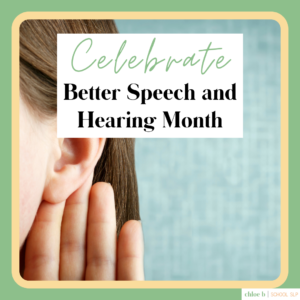It’s hard for parents/caregivers to understand complex SLP related terms such as speech, language, and pathology. However, I think there are ways to easily explain terminology in a comprehensive yet efficient way!
Use Simple Definitions
The key to using parent-friendly is to keep the words we use in the definitions as easy to understand as possible. Here are a few examples of words that I explain to parents/caregivers and how I *generally* phrase it –
- Language – This is what your child understands when someone is talking to them AND what your child is able to say to others.
- Articulation – This is how your child speaks – how they pronounce different sounds.
- Stuttering – This is also how your child speaks – do they repeat words over and over when trying to talk? Do they get stuck?
- Pathology – study of disease, or in my case – disorders! (I work with people who have communication related disorders)
- Speech Language Pathologist – speech therapist, someone who provides communication (and swallowing) therapy – we do more than just speech and language!
- Cognitive Therapy – just like we work on our muscles (in PT/OT) to get stronger, we need to work on our brain “muscles” to strengthen our brain
- AAC – it stands for augmentative and alternative communication. It can be anything used to communicate besides verbal speech such as gestures, using pictures, or using a communication device
- Modified Barium Swallow Study/VFSS – it is like a moving x-ray where we can see exactly what’s happening when you swallow and where the food/drink is going
I could go on alllllllll day. Basically use as simple of language as possible!
So if there’s something specific that you want to know more about – comment below or dm me on social media! (links below)

Use Visuals
Just like our kids like visuals, so do our parents/caregivers! Speechy Musings has this awesome FREE visual that I use all the time after an evaluation when I’m going over the report!
It can be hard to explain the bell curve, especially when we talk about standard scores and percentile ranks, so I love that her visual breaks it all down if parents want to read about it. If not, simply seeing where there child’s scores fall on a bell curve is SO helpful!
I also have Allison For’s giant binder of speech language handouts and they are amazing! It’s great to give parents a visual about their child’s specific areas of need or a developmental chart that can illustrate their current level. She has a free (lite) version here.
Provide Resources on Speech Language and Pathology
Parents may leave you still feeling confused. It can be helpful to provide handouts or other resources that parents can take with them or look at on their own time. They may be in a state of shock when you first explain everything, so once they process it they may seek additional information.
A great one-stop-shop for resources is ASHA (American Speech Language Association). They have simplified developmental milestone handouts as well as quick definitions on the different areas that therapists treat. If it’s something specific, like stuttering, I would include the national stuttering foundation. For autism, I would avoid any Autism Speaks resources (demeaning/ableist) and instead promote resources from autistic individuals. Example link here.
For more information for parents check out these blog posts – What is Articulation? and What Causes a Person to Stutter?
-Choe B | School SLP






6 Responses
Thanks for explaining that articulation is also a huge thing to consider about speech pathology. I’d like to look for a good practitioner of that because my brother recently got into a car accident. He had a pretty bad neck injury that might affect is speech in the long run.
Hey Alice! There are lots of areas of speech pathology that can be impacted after a car accident! Dysarthria can occur (weakness leading to slurred/unclear speech) as well as language issues (like aphasia) and cognitive changes. Swallowing too! I recommend getting him evaluated by a speech language pathologist in your area just to check everything out! Praying for him + you all!